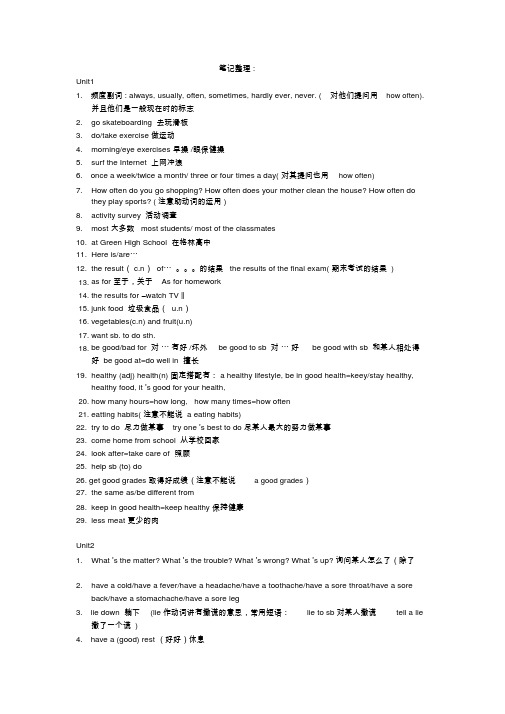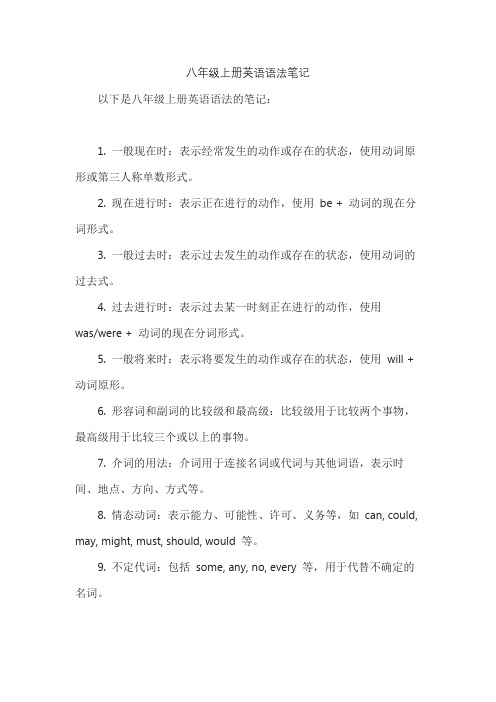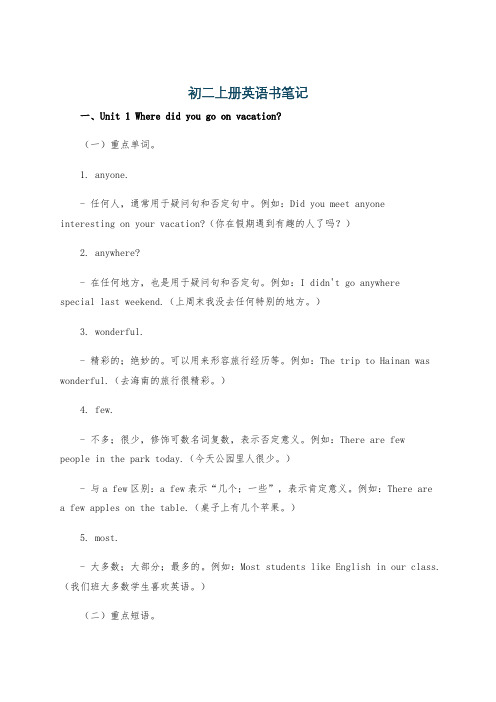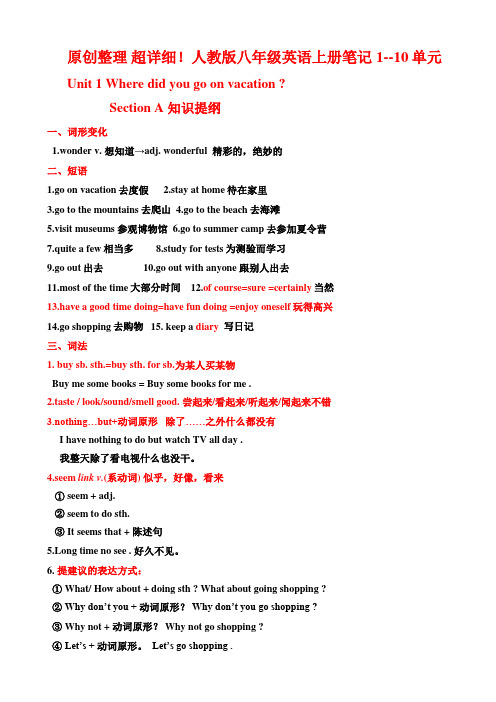八年上英语笔记整理
八年上英语笔记整理

笔记整理 :Unit11. 频度副词 : always, usually, often, sometimes, hardly ever, never. (对他们提问用how often).并且他们是一般现在时的标志2.go skateboarding 去玩滑板3.do/take exercise 做运动4.morning/eye exercises 早操 /眼保健操5.surf the Internet 上网冲浪6. once a week/twice a month/ three or four times a day( 对其提问也用how often)7.How often do you go shopping? How often does your mother clean the house? How often dothey play sports? ( 注意助动词的运用 )8.activity survey 活动调查9.most 大多数 most students/ most of the classmates10.at Green High School 在格林高中11.Here is/are⋯12.the result( c.n) of⋯。
的结果 the results of the final exam( 期末考试的结果 )13.as for 至于,关于 As for homework14.the results for ―watch TV ‖15.junk food 垃圾食品( u.n)16.vegetables(c.n) and fruit(u.n)17.want sb. to do sth.18.be good/bad for 对⋯有好 /坏外be good to sb 对⋯好be good with sb 和某人相处得好 be good at=do well in 擅长19.healthy (adj) health(n) 固定搭配有: a healthy lifestyle, be in good health=keey/stay healthy,healthy food, it ’s good for your health,20.how many hours=how long, how many times=how often21.eatting habits( 注意不能说 a eating habits)22.try to do 尽力做某事 try one ’s best to do 尽某人最大的努力做某事e home from school 从学校回家24.look after=take care of 照顾25.help sb (to) do26. get good grades 取得好成绩(注意不能说 a good grades)27.the same as/be different from28.keep in good health=keep healthy 保持健康29.less meat 更少的肉Unit21.What ’s the matter? What ’s the trouble? What ’s wrong? What ’s up? 询问某人怎么了(除了2.have a cold/have a fever/have a headache/have a toothache/have a sore throat/have a soreback/have a stomachache/have a sore leg3. lie down 躺下(lie 作动词讲有撒谎的意思,常用短语:lie to sb 对某人撒谎tell a lie撒了一个谎 )4. have a (good) rest (好好)休息5.hot tea with honey, coffee with milk/nothing6.see a dentist=go to a dentist7.should/shouldn't do 应该 /不应该做某事8.I ’m not feeling weel/ I don ’tfeel well我感觉不好9.When did it start? 什么时候开始的?( start=begin start to do/doing at the beginning of )10.two days ago (ago 为过去时的标志 )11.I think do. I don ’tthink so. Do you think so? I hope so( 我希望如此 )so+谓语 +主语(某人也如此) e.g. My father is a doctor, so is my mother. He likes Math, so do I. I went toBeijing for vacation, so did my sister.(这一句型请同学们一定好好体会)12.feel better 感觉好多了(注意不要和fell 混淆)13.hope to do/ hope+ 句子(注意没有 hope sb to do 这一句型)这两个句型可以用作同义句的转换。
八年级上册英语语法笔记

八年级上册英语语法笔记
以下是八年级上册英语语法的笔记:
1. 一般现在时:表示经常发生的动作或存在的状态,使用动词原形或第三人称单数形式。
2. 现在进行时:表示正在进行的动作,使用be + 动词的现在分词形式。
3. 一般过去时:表示过去发生的动作或存在的状态,使用动词的过去式。
4. 过去进行时:表示过去某一时刻正在进行的动作,使用
was/were + 动词的现在分词形式。
5. 一般将来时:表示将要发生的动作或存在的状态,使用will + 动词原形。
6. 形容词和副词的比较级和最高级:比较级用于比较两个事物,最高级用于比较三个或以上的事物。
7. 介词的用法:介词用于连接名词或代词与其他词语,表示时间、地点、方向、方式等。
8. 情态动词:表示能力、可能性、许可、义务等,如can, could, may, might, must, should, would 等。
9. 不定代词:包括some, any, no, every 等,用于代替不确定的名词。
10. 反身代词:用于指代动作的执行者,如myself, yourself, himself, herself, itself, ourselves, yourselves, themselves。
八年级上册英语笔记总结

八年级上册英语笔记总结Unit 1:In this unit, I learned about different ways to greet someone in English, such as "Hi, hello, good morning, good afternoon, and good evening." I also learned how to introduce myself and others, and how to ask and answer questions about names, ages, and nationalities. I practiced using the verb "to be" in various sentences and understood how to use possessive adjectives like "my," "your," and "his/her."Unit 2:In Unit 2, I learned about numbers, especially how to express them in words and how to spell them correctly. I also learned about the time, including how to ask and tell the time in both the 12-hour and 24-hour systems. Additionally, I practiced talking about daily activities using the simple present tense.Unit 3:This unit introduced me to different places and how to ask for and give directions. I learned important vocabulary related to locations, such as "bank," "restaurant," and "hospital." I also practiced using prepositions of place and the imperative form to give directions and advice.Unit 4:In Unit 4, I learned about school subjects, such as math, science, and history, as well as how to express likes and dislikes about them. I also learned about hobbies and interests and practiced using the verb "to like" and "to love" to talk about activities I enjoy.Unit 5:This unit focused on family members and relationships. I learned how to talk about my family and the people in it, as well as how to describe appearances and personalities. I alsopracticed using possessive pronouns like "mine," "yours," and "theirs" to talk about ownership.Unit 6:In Unit 6, I learned about different kinds of food and drinks and how to express preferences for them. I also learned how to order food in a restaurant and how to use countable and uncountable nouns correctly.Unit 7:This unit introduced me to different types of clothes and accessories, including how to describe what I and others are wearing. I also practiced using the present continuous tense to talk about actions happening at the moment.Unit 8:In Unit 8, I learned about the past simple tense and how to talk about past experiences and events. I also practicedusing irregular verbs and time expressions to describe activities that happened in the past.Overall, this semester I have gained a solid foundation in basic English language skills, including grammar, vocabulary, and communication. I feel more confident in my ability to speak and understand English and look forward to continuing to improve my language skills in the future.。
初二上册英语书笔记

初二上册英语书笔记一、Unit 1 Where did you go on vacation?(一)重点单词。
1. anyone.- 任何人,通常用于疑问句和否定句中。
例如:Did you meet anyone interesting on your vacation?(你在假期遇到有趣的人了吗?)2. anywhere?- 在任何地方,也是用于疑问句和否定句。
例如:I didn't go anywherespecial last weekend.(上周末我没去任何特别的地方。
)3. wonderful.- 精彩的;绝妙的。
可以用来形容旅行经历等。
例如:The trip to Hainan was wonderful.(去海南的旅行很精彩。
)4. few.- 不多;很少,修饰可数名词复数,表示否定意义。
例如:There are few people in the park today.(今天公园里人很少。
)- 与a few区别:a few表示“几个;一些”,表示肯定意义。
例如:There are a few apples on the table.(桌子上有几个苹果。
)5. most.- 大多数;大部分;最多的。
例如:Most students like English in our class.(我们班大多数学生喜欢英语。
)(二)重点短语。
1. go on vacation.- 去度假。
例如:They went on vacation in Paris last year.(他们去年去巴黎度假了。
)2. stay at home.- 待在家里。
例如:I stayed at home and watched TV yesterday.(我昨天待在家里看电视了。
)3. go to the mountains.- 去爬山。
例如:We went to the mountains and had a great time.(我们去爬山了,玩得很开心。
八年级上册笔记英语

八年级上册笔记英语一、时态:1.一般现在时:一般现在时表示经常发生的动作或状态,常用助动词do 或 does 构成,如:He does his homework every day. 他每天做他的家庭作业。
2.现在进行时:现在进行时表示现在正在进行的动作,常用 am, is, are+ 动词的现在分词构成,如:She is writing a letter. 她正在写信。
3.一般过去时:一般过去时表示过去发生的动作或状态,常用助动词did 构成,如:She did her homework after school.她放学后做了家庭作业。
4.过去将来时和将来时:过去将来时表示过去将要发生的动作,常用助动词 would 构成,如: She said she would finish the paper by Tuesday. 她说她将在星期二之前完成论文。
将来时表示未来将要发生的动作,常用助动词 will 构成,如:He will go to Beijing next week. 他下周去北京。
二、被动语态:1.一般现在时的被动语态:一般现在时的被动语态一般由“助动词be+动词的过去分词”结构构成,如:My book is read by many people. 我的书被很多人阅读。
2.一般过去时的被动语态:一般过去时的被动语态一般由“助动词be+动词的过去分词”结构构成,如:The table was broken by them. 那张桌子被他们弄坏了。
3.一般将来时的被动语态:一般将来时的被动语态一般由“助动词be+动词的过去分词”结构构成,如:This house will be built by us next year. 我们明年将建造这座房子。
三、情态动词:1.有 can, could, may, might, must, ought to, shall, should, will, would 等共11个,它们可以和动词连用,表示对动作的态度,如:He should take more exercise. 他应该多锻炼。
人教版八年级英语上册笔记1--10单元(原创整理,超详细)

原创整理超详细!人教版八年级英语上册笔记1--10单元Unit 1 Where did you go on vacation ?Section A 知识提纲一、词形变化1.wonder v. 想知道→adj. wonderful 精彩的,绝妙的二、短语1.go on vacation去度假2.stay at home待在家里3.go to the mountains去爬山4.go to the beach去海滩5.visit museums 参观博物馆6.go to summer camp去参加夏令营7.quite a few相当多 8.study for tests为测验而学习9.go out出去 10.go out with anyone 跟别人出去11.most of the time大部分时间 12.of course=sure =certainly当然13.have a good time doing=have fun doing =enjoy oneself玩得高兴14.go shopping去购物 15. keep a diary 写日记三、词法1. buy sb. sth.=buy sth. for sb.为某人买某物Buy me some books = Buy some books for me .2.taste / look/sound/smell good. 尝起来/看起来/听起来/闻起来不错3.nothing…but+动词原形除了……之外什么都没有I have nothing to do but watch TV all day .我整天除了看电视什么也没干。
4.seem link v.(系动词) 似乎,好像,看来① seem + adj.② seem to do sth.③ It seems that + 陈述句5.Long time no see . 好久不见。
6. 提建议的表达方式:① What/ How about + doing sth ? What about going shopping ?②Why don’t you + 动词原形?Why don’t you go shopping ?③ Why not + 动词原形? Why not go shopping ?④Let’s + 动词原形。
八年级上册英语重点笔记(精)

八年级上册英语重点笔记(精)- Unit 1: Greetings and Introductions- Basic greetings and responses- Introducing oneself and others- Asking and answering about personal information- Unit 2: Classroom Language- Vocabulary related to classroom objects- Expressions for asking and answering questions in class- Unit 3: Numbers and Time- Cardinal and ordinal numbers- Telling time and expressing schedules- Days of the week, months, and dates- Unit 4: My Family- Vocabulary for family members and extended family - Describing family members and their relationships- Talking about family activities and celebrations- Unit 5: School Life- Vocabulary related to school subjects and activities- Expressing likes, dislikes, and preferences in school- Talking about school rules and responsibilities- Unit 6: Daily Routine- Describing daily activities and routines- Time expressions for daily routines- Talking about personal habits and preferences- Unit 7: Food and Drinks- Vocabulary for food and drinks- Ordering food and drinks in a restaurant- Talking about preferences and dietary habits- Unit 8: Hobbies and Interests- Expressing likes, dislikes, and preferences in leisure activities - Talking about favorite hobbies and pastimes以上为八年级上册英语的重点笔记。
八年级上册英语笔记1~10单元

八年级上册英语笔记(1 - 10 单元)一、Unit 1 Where did you go on vacation?(一)重点词汇1.anyone /ˈeniwʌn/ 任何人-解析:用于疑问句和否定句中,表示“任何人”。
-例句:Did anyone see my keys?(有人看到我的钥匙了吗?)2.wonderful /ˈwʌndəfl/ 精彩的;极好的-解析:形容事物非常好,令人愉悦。
-例句:We had a wonderful time on vacation.(我们在假期里过得非常愉快。
)3.few /fjuː/ 很少;几乎没有-解析:修饰可数名词,表示数量少。
-例句:There are few people in the park today.(今天公园里人很少。
)4.quite a few 相当多;不少-解析:强调数量比较多。
-例句:I took quite a few photos on my trip.(我在旅行中拍了不少照片。
)5.most /məʊst/ 大多数;大部分-解析:可作形容词、名词或副词。
-例句:Most people like to travel.(大多数人喜欢旅行。
)(二)重点句型1.Where did you go on vacation? 你去哪里度假了?-解析:这是一个特殊疑问句,询问过去的动作。
-例句:Where did you go last weekend?(你上周末去哪里了?)2.Did you go anywhere interesting? 你去了什么有趣的地方吗?-解析:一般疑问句,用“Did + 主语+ 动词原形”的结构。
-例句:Did you do anything special yesterday?(你昨天做了什么特别的事情吗?)3.I went to the mountains. 我去了山区。
-解析:简单的陈述句,表达过去的动作。
- 1、下载文档前请自行甄别文档内容的完整性,平台不提供额外的编辑、内容补充、找答案等附加服务。
- 2、"仅部分预览"的文档,不可在线预览部分如存在完整性等问题,可反馈申请退款(可完整预览的文档不适用该条件!)。
- 3、如文档侵犯您的权益,请联系客服反馈,我们会尽快为您处理(人工客服工作时间:9:00-18:30)。
笔记整理:Unit11.频度副词: always, usually, often, sometimes, hardly ever, never. (对他们提问用how often).并且他们是一般现在时的标志2.go skateboarding 去玩滑板3.do/take exercise 做运动4.morning/eye exercises早操/眼保健操5.surf the Internet 上网冲浪6.once a week/twice a month/ three or four times a day(对其提问也用how often)7.How often do you go shopping? How often does your mother clean the house? How often dothey play sports? (注意助动词的运用)8.activity survey 活动调查9.most 大多数most students/ most of the classmates10.at Green High School 在格林高中11.Here is/are…12.the result(c.n)of…。
的结果the results of the final exam(期末考试的结果)13.as for 至于,关于As for homework14.the results for “watch TV”15.junk food 垃圾食品(u.n)16.vegetables(c.n) and fruit(u.n)17.want sb. to do sth.18.be good/bad for 对…有好/坏外be good to sb 对…好be good with sb 和某人相处得好be good at=do well in 擅长19.healthy (adj) health(n) 固定搭配有:a healthy lifestyle, be in good health=keey/stay healthy,healthy food, it’s good for your health,20.how many hours=how long, how many times=how often21.eatting habits(注意不能说a eating habits)22.try to do 尽力做某事try one’s best to do尽某人最大的努力做某事e home from school 从学校回家24.look after=take care of 照顾25.help sb (to) do26.get good grades 取得好成绩(注意不能说a good grades)27.the same as/be different from28.keep in good health=keep healthy保持健康29.less meat更少的肉Unit21.What’s the matter? What’s the trouble? What’s wrong? What’s up? 询问某人怎么了(除了What’s up外,都可以在后面加上with sb)2.have a cold/have a fever/have a headache/have a toothache/have a sore throat/have a soreback/have a stomachache/have a sore leg3.lie down 躺下(lie作动词讲有撒谎的意思,常用短语:lie to sb 对某人撒谎tell a lie撒了一个谎)4.have a (good) rest (好好)休息5.hot tea with honey, coffee with milk/nothing6.see a dentist=go to a dentist7.should/shouldn't do 应该/不应该做某事8.I’m not feeling weel/ I don’t feel well 我感觉不好9.When did it start?什么时候开始的?(start=begin start to do/doing at the beginning of)10.two days ago (ago为过去时的标志)11.I think do. I don’t think so. Do you think so? I hope so(我希望如此) so+谓语+主语(某人也如此)e.g. My father is a doctor, so is my mother. He likes Math, so do I. I went to Beijing for vacation, so did my sister.(这一句型请同学们一定好好体会)12.feel better 感觉好多了(注意不要和fell混淆)13.hope to do/ hope+句子(注意没有hope sb to do这一句型)这两个句型可以用作同义句的转换。
E.g. I hope I can be a super star one day=I hope to be a super star one day.14.ill(adj)/illness(c.n) an illness happy—happiness kind—kindness15.advice(u.n) give me some advice给我一些建议16.be/get stressed out 变得紧张17.problem (指身体上或生活中遇到的问题)question(指学习中的问题) trouble(麻烦,常见短语:have trouble (in) doing sth. 做某事有麻烦)18.the Chinese way 中国方式19.on on e’s way to sp 在去哪里的路上 e.g. on my way to school on his way home20.traditional Chinese doctor 传统中医21.believe (注意不要拼写为belive) I belive that+句子22.need to do needn’t do 没必要做某事23.a balance of yin and yang 阴阳平衡24.for example 例如25.hot yang foods(这里的food指食物种类,所在加s)26.too much ying 太多阴气too much+u.n much too+adj27.take/have medicine 吃药give medicine 给药,开药28.popular with sb29.western country 西方国家30.It’s +adj for sb to do sth 对于某人来说做某事e.g It’s important for us to learn English well.31.a balanced diet 平衡饮食32.at the moment=now(为现在进行时的标志)33.not…until…直到。
才 e.g. I didn’t go home until 12 o’clock last night.34.host 主人host family 寄宿家庭Unit31.现在进行时可以表示将要发生的事情(doing前不要忘了加be动词)2.表示将来的时间状语有:tomorrow, the day after tomorrow, next week, next Saturday等3.go camping/fishing/bike riding/sightseeing4.babysit sb. 照顾小孩=look after=take care of5.Who are you going with? 你打算和谁去(不要忘记with)6.vacation plans 假期计划7.for+时间段(对其提问用how long)8.go away 离开run away 跑开far away from…离。
很远9.have a good time=have fun=enjoy oneself (具体换成myself/yourself/himself/herself/itself/ourselves/yourselve/themselves)10.send sb sth=send sth to sb show sb sth=show sth to sb11.get back/come back/return to sp 回到某地12.How long is he staying? 他打算呆多久13.rent sth from sb 向某人租某物14.How’s the weather there|?= what’s the weather like there?15.be famous for sth be famous as sb16.take a long vacation 度长假17.think about doing 思考做某事18.decide to do 决定做某事decide on sth 决定某事19.hear sb do sth(听见某人做过/经常做某事) hear sb doing sth. (听见某人正在做某事)20.something different nothing intereting anything exciting (形容词放在不定代词之后)21.spend sb time/money doing sth= it takes sb time\money to do sthe.g. I spend two hours finishing my homework= It takes me two hours to finish myhomework.24. leave 离开/遗留leave for 动身前往某地leave A for B 离开A去B25. in the beautiful countryside 在美丽的乡下26. forget to do remember to do27. all my problems 我所有的烦恼28. can’t wait to do 迫不及待做某事30. make movies 拍摄电影31. finish doing sth finish—finishes32. ask sb about sth ask sb (not) to do sth ask sb for sth33. a good place to go sightseeing 一个观光的好地方34. in the mountains 在山上Unit41. 对交通工具提问用how e.g. How do you get to school? How does Mary get to work? How do they go to the park?2. 乘坐交通工具的短语分动词短语和介词短语,需要注意的是:walk—on foot ride a bike—by bike/on one’s bike go in parent s’ car—by car/in one’s car两种短语经常用于同义句的转换:I often take the subway to school= I often go to school by subway.My father took the bus back home yesterday. =my father went back home by bus yesterday.3. one hundred two hundred hundreds of(具体几百不加S 成百上千要加S)4. how far 多远,对路程,距离提问5. 10 kilometers (away) from school. 离学校10-公里远6. the early bus7. take sb to sp 带某人去某地8. bus ride/ bike ride/ walk 公交车程/自行车程/路程9. What do you think of the transportation?= how do you like the transportation?10. students around the world全世界的学生around the world= all over the world11. on the school bus12. North America13. in other parts of the world 在世界的其他地方14. depend on15. must be 肯定是can’t be 肯定不是may be 可能是16. not all students 不是所有的学生17. means of transportation 交通方式18. a number of…许多 a small/large number of…少量/大量(他们后面都跟可数名词)The number of……的数量19. live from 住在离…的地方 e.g. How far do you live from you school?你住在离学校多远的地方?20. ill in the hospital 生病住院21.Don’t worry 别担心worry—worries worry about sth/sbUnit51.Can you/Could you…表示邀请(回答为Sure/ great/yes, I’d love to. Sorry, I can’t. Ihave to…)2.have a piano lesson3.go to my guitar lesson4.say sth to…对。
